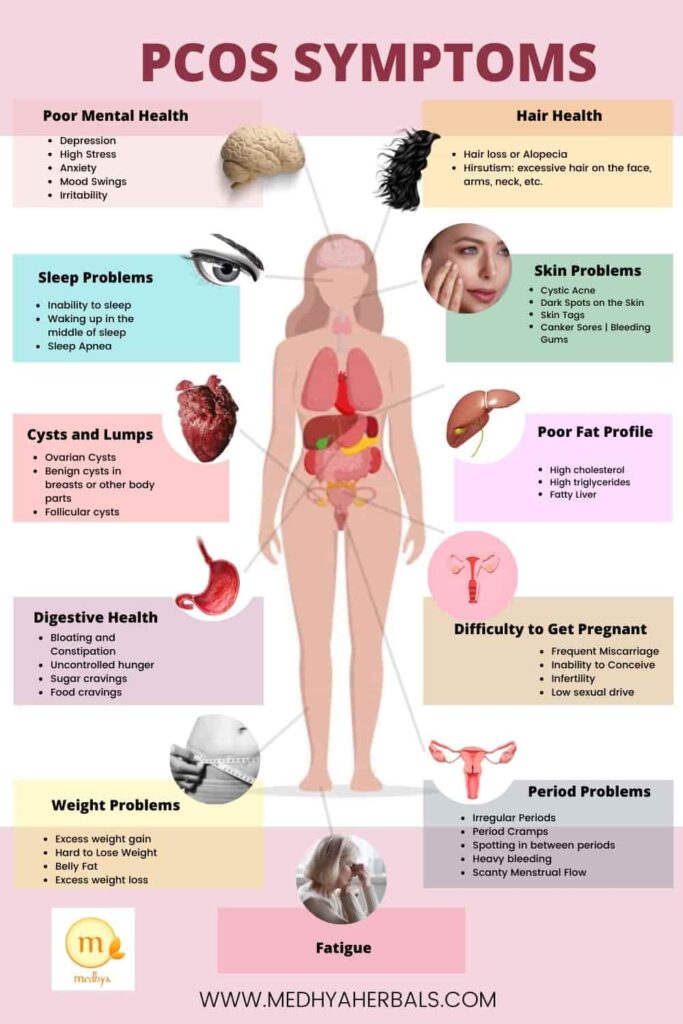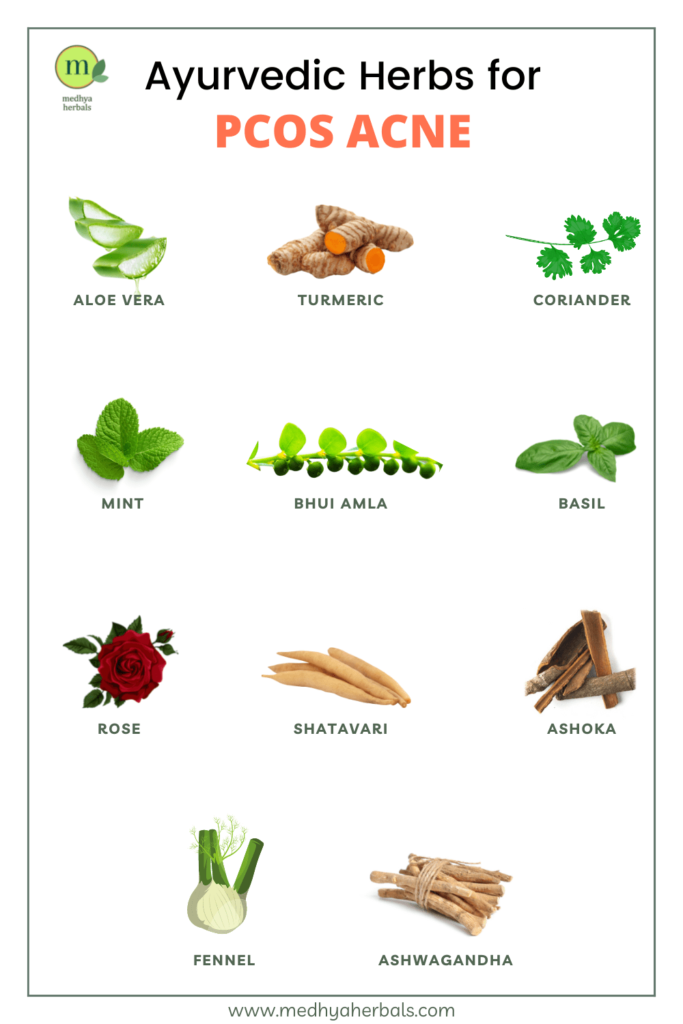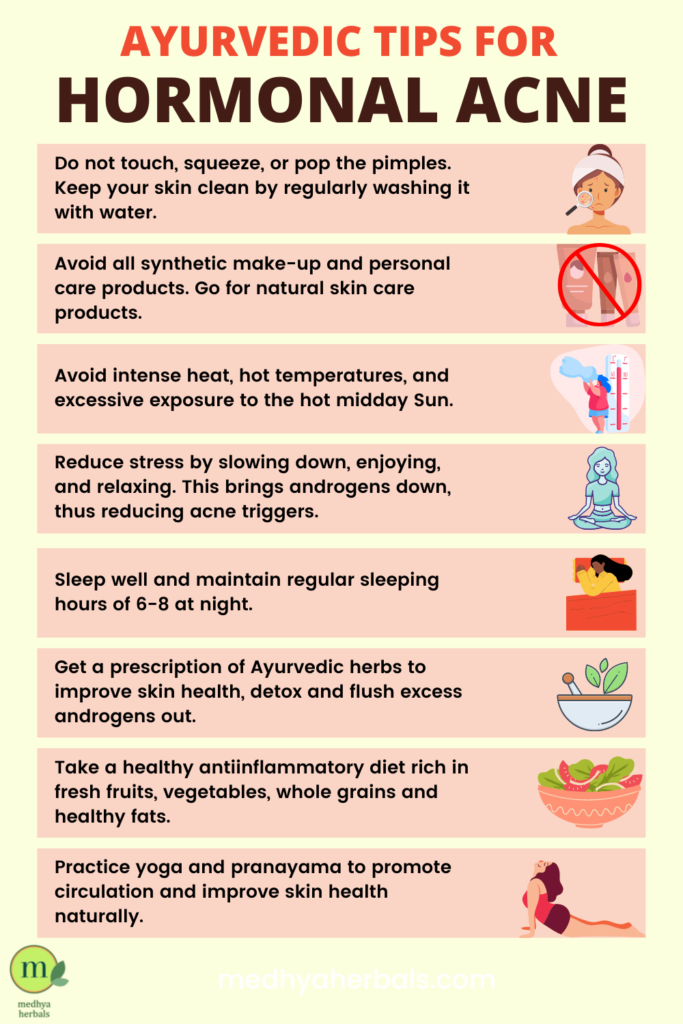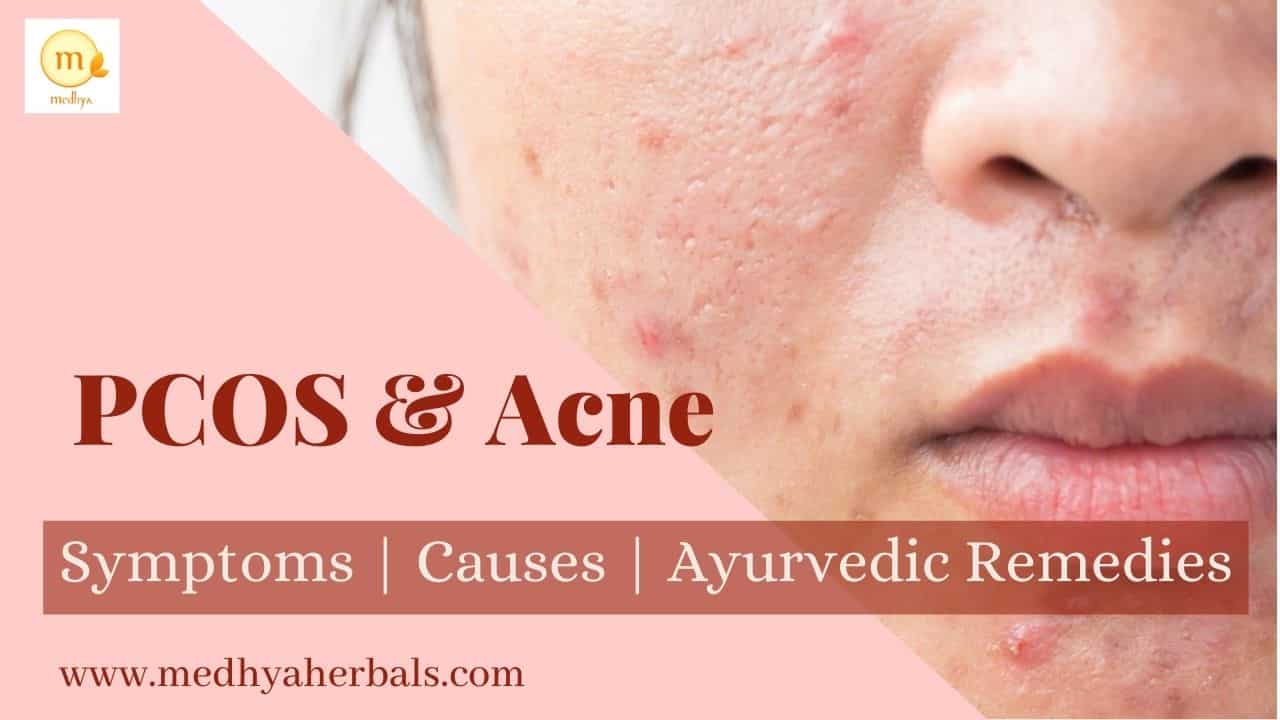PCOS acne originates in and gets worse with the hormonal imbalance that also causes other pcos symptom. Since the underlying cause of pcos acne is not lack of skin care, topical solutions and cosmetic treatments often fail to give any results.
On the other hand, a holistic approach that Ayurvedic treatment for polycystic ovary syndrome gives has proven to be highly effective in treatment of PCOS acne and other symptoms as hair loss and unwanted hair growth.
In this post we will look into the causes, symptoms and Ayurvedic treatment options involving herbal medicine, diet, lifestyle and natural skin care routine to find relief from pcos acne.
What is PCOS (Polycystic Ovarian Syndrome)?
PCOS is a medical condition in which multiple cysts form in the ovaries of a woman due to disruption in the normal menstrual cycle.
Polycystic ovary syndrome (PCOS) is a set of symptoms that appear in women of reproductive age. It is one of the leading causes of irregular periods and sub fertility in women.
PCOS and PCOD (polycystic ovarian disease) is caused by a variety of factors such as:
- Insulin resistance
- Hormonal Imbalance
- Excess Androgen or Hyperandrogenism (that is to say, high levels of male hormone in a woman)
- High Cortisol or Stress
- Genetics
- Excess Weight or Obesity
- Exposure to hormone disturbing chemicals
PCOS is one of the leading causes of infertility in women of reproductive age. As such, it should not be handled with levity if found out.
PCOS Symptoms

PCOS Symptoms vary from woman to woman. Also, different women have differing degrees of severity.
While PCOS symptom might not be exactly the same for every woman, a common factor for women with PCOS is that they have hormonal imbalance.
For example, if you are experiencing excess Androgen or high levels of male hormone, then you will constantly struggle with Irregular periods, facial hair, hormonal acne and hair loss on the scalp.
Some of the common symptoms of PCOS are:
- Menstrual disorder involving menstrual irregularity
- PCOS Hair loss
- Infertility
- Ovarian cyst or cysts on the ovaries
- Hard to lose weight
- Mood Swings and Fatigue
- Digestive problems
- Unwanted hair growth
Skin Problems and Acne in PCOS
Hormone Imbalance in PCOS can actually affect your skin in a number of ways. Here are some examples:
- Alopecia – Excessive hair loss and hair thinning
- Hirsutism – Unwanted hair on face, chest, and other body parts
- Acanthosis nigricans – Darkening of the skin on the neck, underarms, and other body parts
- Skin breakouts, acne, and pimples
These can all be traced back to high levels of androgens (male hormone) in your body.
What Causes PCOS Acne?
PCOS Acne is rooted in excess Androgen or male hormones such as Testosterone, Androstenedione and DHEA.
Let’s take a better look into how it affects your skin health:
1. Excessive Androgens in your blood stream
Excessive male hormones or Androgens in PCOS lead to the development of acne through a series of actions. Here’s what happens:
- There is excessive production of androgens by your endocrine system.
- Also, your body is not able to get rid of excess hormones through its natural detoxification pathways.
- This leads to high levels of androgens in the blood stream of women with PCOS.
- When there is high levels of androgens, your body cells start to respond their constant stimulation.
This increased sensitivity of your body cells to androgens also shows up in the sebaceous glands.
2. Sebaceous Glands Become Hyperactive
The sebaceous glands are glands associated with the hair follicles. They secrete an oily substance called sebum, which lubricates the hair follicles to keep them and the hair healthy.
Now, with an increased sensitivity to testosterone and excessive levels of the hormone, these sebaceous glands go into overdrive.
Consequently, they begin to overproduce sebum. This leaves the skin with excessive oil, which can block up the skin pores.
The excess of oil is a major precursor for acne.
3. The excessive oil makes things worse
Let’s go further on this journey to understand how PCOS causes acne.
Now, the excess oil is already clogging up skin pores. In addition to that, this sebum dilutes linoleic acid.
Linoleic acid, by the way, is a chemical that assists the skin in sloughing (shedding) off dead skin cells from the surface of the skin.
With linoleic acid gets diluted, its function is compromised. The skin is left with excessive dead skin cells.
This combination of oiliness and accumulated dead skin cells further blocks the skin pores.
Then the acne causing bacteria (propionibacterium) takes this chance to colonize and multiply. It is this that now causes acne.
4. High Inflammation in women with PCOS
PCOS patient have higher levels of C-reactive protein (CRP). This is involved in immune responses that cause inflammation.
Inflammation is the body’s way of saying, “I’m injured and trying to heal, don’t touch me.” With the pain and inflammation, you are forced to leave that body part untouched while it heals.
Since there are higher levels of this CRP, inflammation occurs more readily. This serves to worsen off PCOS acne.
Now that you have an understanding of how hormonal imbalance in PCOS causes acne. Let’s take a look into Ayurveda treatment for PCOS acne.
An Ayurvedic View of PCOS Acne
As per Ayurveda, your skin condition in PCOS acne depends on the dosha that have gone out of balance. Below, you can find they key to correlate dosha imbalance with the health of your skin:
- Vata acne makes your skin dry and raspy. Vata dosha Imbalance leads to poor circulation and nutritional deficiency in the skin.
- Pitta acne has fiery red protrusions that are particularly painful. Pitta Dosha Imbalance leads to inflammation and burning sensation. It is also one of the primary Doshas that trigger Acne breakouts, especially adult acne.
- Kapha Acne presents with swollen, pus-filled cysts. Kapha Dosha Imbalance leads to clogged pores and development of fungal or bacterial infections of the skin.
PCOS itself is also a problem mainly with the kapha dosha. However, other doshas also have a role to play. These cascade of imbalances then lead to other complications, including skin conditions like acne.
Ayurvedic Medicine for Treatment of PCOS Acne
Ayurvedic herbs for PCOS treatment provide an effective way to reinstate hormonal balance and support normal functioning of the reproductive system. Ayurveda medicines are powerful anti-inflammatory agents that help to detox, improve insulin sensitivity, reduce inflammation and promote healthy skin.

Ayurvedic herbs such as fennel, aloe vera, ashoka and turmeric reduce inflammation in the skin, improve circulation and control excess androgen in a pcos patient.
Ayurvedic medicines as Ashwagandha, Shatavari, Tulsi and Kachanar Guggulu help with hormone balance, tone up the reproductive system and induce regular menstrual cycle.
Kitchen herbs such as coriander, rose, mint, lemongrass, cinnamon and cardamom support digestive fire, promote insulin sensitivity and balance blood sugar levels.
These Ayurvedic herbs should be consumed upon consultation with Ayurvedic doctor, who can advise you on specific dosage and directions.
Ayurvedic Diet and Best Foods to Treat PCOS Acne
The type of foods you eat and your diet overall plays an important role in the health of your skin.
Ayurveda states that one should consume foods that support digestive fire and reduce inflammation in the body.
Specifically for skin health, you should have a Vata dosha and Pitta dosha pacifying diet.
Here are the general guidelines:
- Include blood purifying and antioxidants rich foods in your daily diet. Some examples are: watercress, green leafy vegetables, cruciferous vegetables, raisins, green tea, ginger and garlic.
- Drink a lot of water to keep yourself hydrated at all times. Prefer cooling and normal temperature beverages such as coconut water, still water, and herbal teas.
- Eat vegetables and fruits that help to balance hormones and reduce excess andogrens. Some examples are: Apricots, banana, cherry, coconut, kiwi, lemon, carrots, green beans, leeks, spinach, oats, quinoa and rice.
- Do not hold off hunger or delay your meals. Always eat on the same time every day.
Worst Foods for PCOS acne
- Eliminate foods with a hot potency and hot temperature such as chilli and cayenne pepper.
- Avoid excess salt, chilies, spices, sour foods, and pickles.
- Stop consuming junk food, and carbonated drinks.
- Stop the consumption of processed foods and packaged foods.
- Remove and avoid smoking, alcohol and nicotine.
Ayurvedic Tips to Prevent and Treat Acne in PCOS

- Do not touch, squeeze, or pop the pimples. Keep your skin clean by regularly washing it with normal temperature fresh water.
- Avoid tight clothes and prefer loose fitting clothes that improve circulation. Prefer natural fibres such as cotton and stay away from synthetic clothing.
- Avoid all synthetic make-up and personal care products. Only apply natural and chemicals free products to your skin. Remember, nearly 60% of what you apply to your skin goes inside.
- Avoid intense heat, hot temperatures, and excessive exposure to the hot midday Sun as it will aggravate pitta dosha and lead to acne breakouts.
- Handle stress by slowing down, enjoying, and relaxing. Be in the moment and do things for the sole purpose of joy rather than productivity. When you manage stress, then Cortisol (stress hormone) goes down. It also helps to bring the excess hormone levels down.
- Sleep well and maintain regular sleeping hours of 6-8 at night. Check out Ayurvedic guidelines for good sleep in here.
- Exercise at least 3 – 5 days a week through stabilising workout routines such as involving in recreational and non-competitive sports, traditional dances, swimming, hiking, running or brisk walking in nature or near water, yoga, Tai Chi, or Cycling.
Natural Skin Care Routine for PCOS Acne
Skin hygiene and care is an important step to control your acne problems at the root.
Steps of skin care as given below will help you to provide required nourishment to keep your skin cells healthy.
1. Cleansing
Regular cleansing removes excess oil, debris, impurities, and makeup that contribute to clogged pores and create the conditions for acne. Clean your skin regularly, but do not overdo it.
You can go for deep cleansing every once in a while to subside the effects of the Sun and pollutants on your skin.
Always use natural cleansers that are mild and suitable to your skin. Some examples are: Raw Milk, Coconut Water, Rose Water, Coconut Milk.
2. Steaming
Steaming helps to loosen the skin pores (temporarily). This thus easily expels out the stubborn impurities that tend to block your pores.
Add some green tea or astringent herbs to the boiling water as they will be absorbed by your skin. This will help to naturally detoxify your skin and reduce sebum production by the glands.
3. Exfoliation
It is usually helpful for low to mild acne breakouts. Regular and gentle exfoliation with natural products such as oatmeal and cream of milk can help to clear away the dead skin cells and improve circulation through the pores.
Do not do exfoliation (without consultation) for moderate to severe acne such as papules, pustules and nodules. They may get aggravated and inflamed.
4. Natural Face Masks
Face masks consisting of astringent and cooling herbs can help to balance Pitta and Kapha dosha on the skin. It will reduce excess oil production from the sebaceous glands, reduce inflammation, clear out the pores and naturally detoxify your skin. You can apply them after steaming or exfoliation.
Here are some excellent natural face masks that you can use:
- Fullers Earth: Improves circulation, sloughs away dead skin cells and controls oil production
- Curd with Licorice powder and Turmeric Powder: Make by adding half tsp each of Licorice and Turmeric to 1 tbsp curd
- Aloe gel and Hibiscus flower: Add 1 tsp hibiscus flower powder to 1 tbsp Aloe gel
- Half tsp Turmeric Powder in Half tbsp Bengal Gram Powder (Besan) and 1.5 tbsp Curd or Raw Milk
5. Moisturizing
Moisturizing your skin is an essential step in natural skin care for PCOS Acne. It will help to keep the skin supple and prevent oil formation overdrive by the sebaceous glands.
Go for natural water based moisturizers that will hydrate and nourish your skin. Here are some examples: coconut oil, aloe gel, coconut milk, olive oil, ghee and honey.
Takeaway!
PCOS Acne can seem hard and debilitating! However, you should know that acne is actually one of the easiest pcos symptom to deal with. And that when you start to address the hormonal imbalance that cause it in the first place, you can really see improvement in your skin health.
Ayurveda offers effective natural ways for pcos treatment at the root cause level. Ayurvedic diet, lifestyle and medication provides a holistic natural avenue for permanent relief from pcos symptom at the root cause level.
Start your PCOS healing journey with Medhya’s Heal PCOS Ayurvedic Treatment health programme. Get in touch with us for your personalised health plan involving prescription for Ayurvedic medicine, diet, yoga and lifestyle guidelines to find relief from PCOS for good.
FAQ
1. How to Treat PCOS Acne?
For PCOS Acne treatment, you should look into solutions that will help you to remove the root cause of your skin problems. Now, for hormonal acne, it is actually high level of Testosterone (male hormones).
So, the line of treatment for acne should reduce the androgens and restore hormonal balance as a whole.
Treating the acne alone here will not work, because the acne is not the major problem. It is rather an extension of the polycystic ovarian syndrome.
In modern times, the go-to solution most of the time is to use oral contraceptives (birth control pills) to mask the symptoms. But then, that’s all they do, mask the symptoms.
That’s why when you are prone to get severe acne breakouts as soon as you try to get off the pill.
On the other hand, PCOS acne responds very well to simple changes in your diet and lifestyle. That’s why your diet is actually the first step in the management of PCOS acne.
2. Can PCOS cause Skin Problems and Acne?
Yes! PCOS and skin problems are closely related. In fact, a number of women get PCOS diagnosis when they start to struggle with severe acne that doesn’t seem to go off!
It is estimated that of all the women with PCOS, between 10 – 35% struggle with pcos acne and skin breakouts.
Note though, that acne doesn’t always mean there is PCOS. However, having PCOS puts you at an increased risk of hormonal acne.
3. What does acne look like with PCOS?
Acne is a common symptom of PCOS, and it can present in a number of different ways. The most common form of acne is called papules, which are small, red bumps that typically appear on the face, chest, and back. Another type of acne, called pustules, are similar to papules but also contain pus.
In more severe cases, acne can develop into nodules or cysts, which are large, painful lesions that can lead to scarring.
While acne is often thought of as a teenage problem, women with PCOS often struggle with breakouts well into adulthood.
Also, PCOS acne goes beyond the face. It spreads to the neck, chest, etc.
Fortunately, Ayurveda offers a number of natural pcos treatment options. Your Ayurvedic doctor may advise you with changes in your diet & lifestyle, skin care routine and specific Ayurvedic medicine to counter acne related skin problems and other pcos symptom.
4. Can Ayurveda Cure PCOS?
PCOS is a hormonal disorder that can cause irregular period, weight gain, acne, and fertility problems. While there is no cure for PCOS, Ayurveda offers a natural approach to managing the symptoms. According to Ayurveda, PCOS is caused by an imbalance of the three doshas: vata, pitta, and kapha. To treat PCOS, Ayurveda recommends a holistic approach that includes dietary changes, lifestyle modifications, and herbal remedies. by following these recommendations, you can restore balance to your body and improve your overall health. In addition, Ayurveda can help to ease the psychological effects of PCOS by increasing self-awareness and promoting a sense of wellbeing. As a result, Ayurveda offers a safe and effective way to manage the symptoms of PCOS.
References

